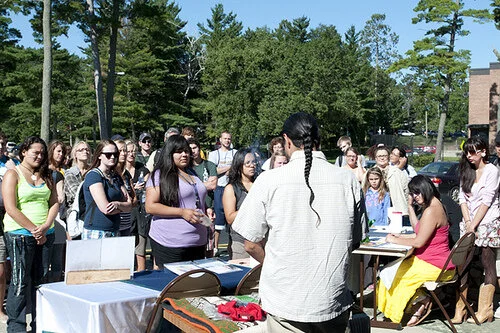Preserving and teaching Indigenous languages is literally a race against time in many cases, and Covid-19 has made that race even more difficult as it most severely impacts elders. One of Treuer’s other projects is collecting stories from elders to print into books. It’s a task that normally requires convening 50 people, and so it’s been put on hold for now. “In Mille Lacs, one of the elders that was a major contributor on our books just died. So if not for that, we probably would have had another 20 stories from her,” says Treuer.
Read MoreLuckily, the intersection of Indigenous language and technology is nothing new and goes far beyond online Zoom classes. For more than a decade, Indigenous speakers have been making great headway to digitize their languages for future generations, noting its ability to — as Treuer put it — bridge space and time.
Read More“Learning an indigenous language is a powerful healing and decolonizing act.” —Anton Treuer in The Language Warrior’s Manifesto
Read More“The future vitality of the Ojibwe language is not certain, but it is certainly possible.” —Anton Treuer
Read More“He told me that the language was the key to everything in our culture,” Treuer wrote. “It was the cipher for sacred knowledge, and the Ojibwe way of being.”
Read MoreAnton Treuer leads the Ojibwe language revitalization efforts at Bemidji State University and helps other programs across Minnesota.
Read MoreAnton Treuer’s Indian name is waagosh, the Ojibwe word for fox, an animal known for its spry bounding. Treuer (pronounced Troy-er), a professor of Ojibwe language, often moves in this very manner: light on his feet, perpetually in motion, zigzagging between the ancient world and the modern one. He’s a man with one foot in the wigwam, and the other in the ivory tower, as he’s been known to put it. —Rachel Hutton
Read MoreAnton Treuer has authored “The Language Warrior’s Manifesto, How to Keep Our Languages Alive No Matter the Odds.” Treuer is professor of Ojibwe at Bemidji State University, and he joins us to discuss the importance of revitalizing indigenous languages and cultures.
Read More“People wish it well, they just don’t necessarily do things to make it well,” Treuer says. “I think there’s a tendency for people in the mainstream to think of languages as like pretty birds singing in the forest. Like, ‘We love all the pretty birds. That’s neat. But not important.’ And that’s simply not the case.”
Read More“My story and the story of communities like Lac Courte Oreilles are not isolated developments. They are part of an upswell, a resurgence, a revitalization of indigenous languages and cultures started by language warriors in many places. Their stories are incredible. They are inspiring. And they point the way.” —Anton Treuer
Read MoreThe goal, “is about building strong human beings who are OK in their own skin as load-bearing members of the country and the world, and with a toolbox for health and happiness.” —Anton Treuer
Read MoreThe history of the Ojibwe people goes back thousands of years and is woven into the story of the state of Minnesota. One writer and college professor is determined that Ojibwe history, language and culture not be forgotten.
Read MoreWorking hard to keep the Ojibwe language alive.
Read More













